News
News
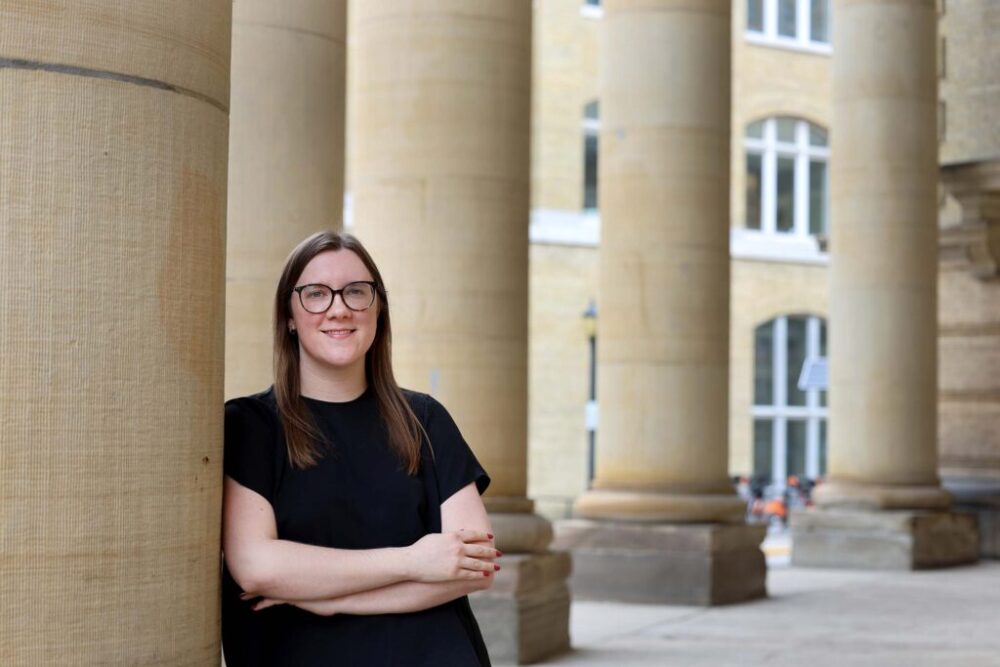 Ahead of the United Nation’s Sustainable Gastronomy Day on June 18, 2024, CivMin chatted with Emily Farrar to learn more about this entrepreneurial endeavour, completely different than the research field they’re in, to grow beef fat in a laboratory environment. The resulting impact of this research could see real beef flavour in foods, without the slaughtering of animals, as well as an impact to climate change through reduced emissions.
Ahead of the United Nation’s Sustainable Gastronomy Day on June 18, 2024, CivMin chatted with Emily Farrar to learn more about this entrepreneurial endeavour, completely different than the research field they’re in, to grow beef fat in a laboratory environment. The resulting impact of this research could see real beef flavour in foods, without the slaughtering of animals, as well as an impact to climate change through reduced emissions.
Farrar is pursuing a PhD in the Department of Civil & Mineral Engineering at the University of Toronto under the supervision of Professor Marianne Hatzopoulou. Read more…
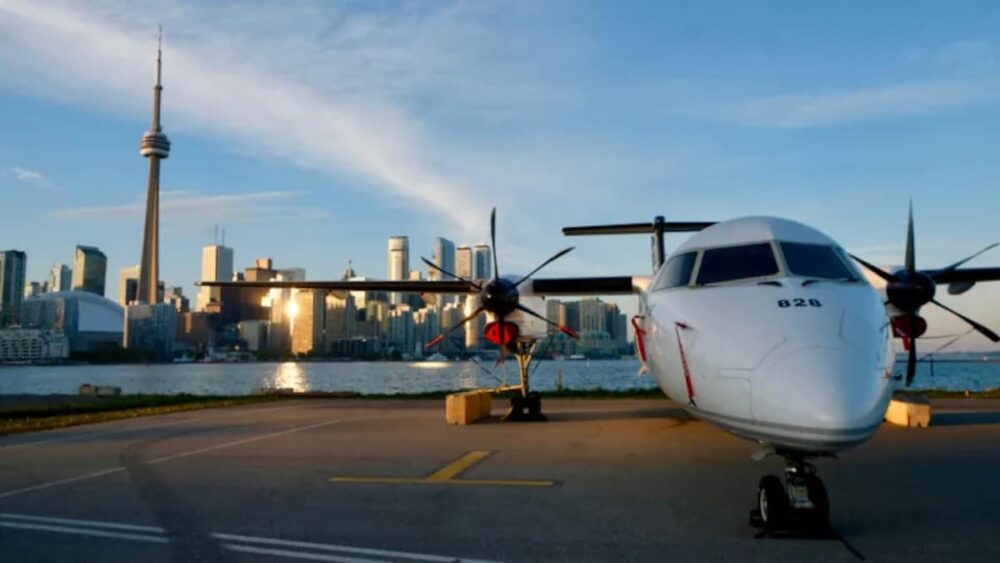 Des résidents du quartier Bathurst Quay, à Toronto, interpellent différents ordres de gouvernement pour réclamer davantage de recherches sur la qualité de l’air à la lumière de la publication d’une nouvelle étude sur la pollution de l’air dans leur quartier.
Des résidents du quartier Bathurst Quay, à Toronto, interpellent différents ordres de gouvernement pour réclamer davantage de recherches sur la qualité de l’air à la lumière de la publication d’une nouvelle étude sur la pollution de l’air dans leur quartier.
En mai, une équipe de l’Université de Toronto a publié une étude réalisée à la demande de la communauté dans laquelle elle révèle que les activités liées à l’aéroport Billy Bishop, dans le sud du quartier, augmentent l’exposition à la pollution dans le quartier
. Read more…
 PhD student Weaam Jaafar won third place in the 2024 Five Minute Thesis Competition (5MT) launched by The Mobility Network. The winners were announced at a ceremony on Tuesday, June 11.
PhD student Weaam Jaafar won third place in the 2024 Five Minute Thesis Competition (5MT) launched by The Mobility Network. The winners were announced at a ceremony on Tuesday, June 11.
His research “‘Capturing the Impacts of Construction Activities Using a Network of Low-Cost Sensors Placed on Residential Balconies” aims at working with a community as citizen scientists to assess the contribution of construction sites to the air quality of the community. Weaam is supervised by Prof. Marianne Hatzopoulou. Read more…
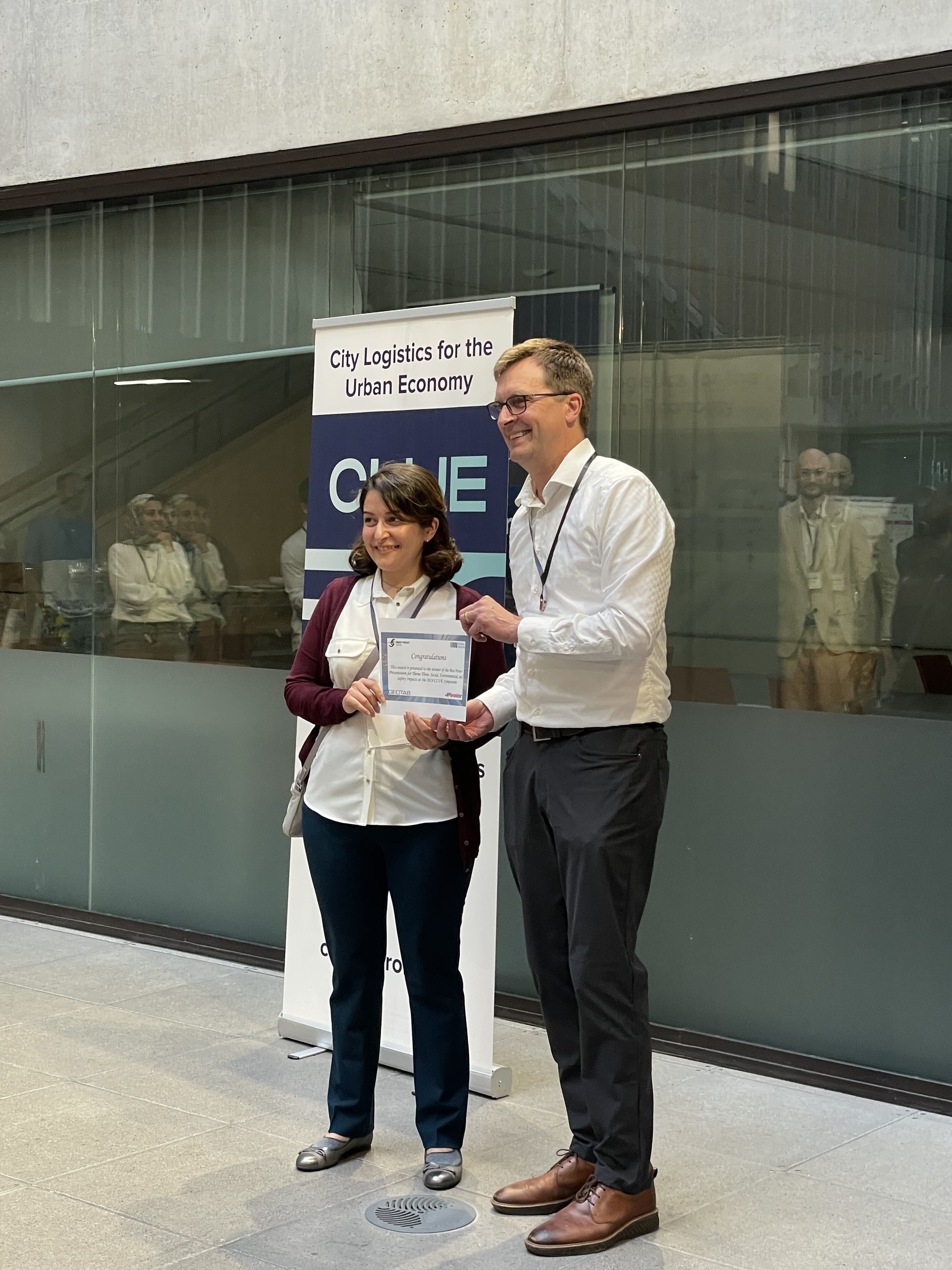 Sara Torbatian, a CivMin PhD student under the supervision of Prof. Marianne Hatzopoulou, was recognized as the best presenter for her theme “Social, Environmental, and Safety Impacts” at the third annual symposium for City Logistics for the Urban Economy (CLUE). She presented a poster titled “Implications of Freight Electrification Scenarios for GHG Emissions, Air Quality Health, and Environmental Justice”. This study explores the potential co-benefits associated with electrification, one important pathway toward decarbonization of freight. In this study, a detailed assessment of freight electrification scenarios (including light, medium, and heavy-duty trucks) was conducted from different perspectives including air quality, health, and environmental justice, using the Greater Toronto and Hamilton Area (GTHA) as a testbed. Read more…
Sara Torbatian, a CivMin PhD student under the supervision of Prof. Marianne Hatzopoulou, was recognized as the best presenter for her theme “Social, Environmental, and Safety Impacts” at the third annual symposium for City Logistics for the Urban Economy (CLUE). She presented a poster titled “Implications of Freight Electrification Scenarios for GHG Emissions, Air Quality Health, and Environmental Justice”. This study explores the potential co-benefits associated with electrification, one important pathway toward decarbonization of freight. In this study, a detailed assessment of freight electrification scenarios (including light, medium, and heavy-duty trucks) was conducted from different perspectives including air quality, health, and environmental justice, using the Greater Toronto and Hamilton Area (GTHA) as a testbed. Read more…

New funding from the Government of Canada will support a multidisciplinary collaboration designed to inform strategic, evidence-based investments in transportation infrastructure across the Greater Toronto and Hamilton Area (GTHA).
The project — known as The Road to Net Zero — is led out of Positive Zero Transport Futures, a cluster within the University of Toronto’s Mobility Network. Read more…
2023 World Conference on Transport Research
![]()
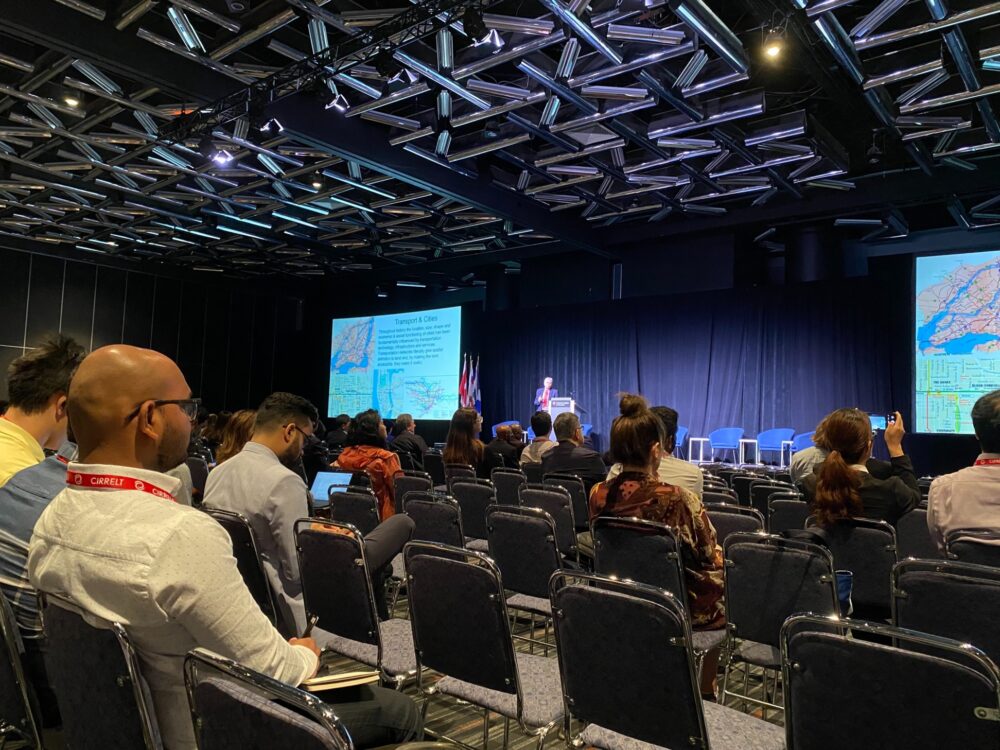
![]() PositiveZero trainee Emily Farrar presented her research at the 2023 World Conference on Transport Research this week (17 -21 July, 2023) in Montréal. Learn more about WCTR here: http://wctr2023.ca/.
PositiveZero trainee Emily Farrar presented her research at the 2023 World Conference on Transport Research this week (17 -21 July, 2023) in Montréal. Learn more about WCTR here: http://wctr2023.ca/.
Emily Farrar gives keynote at Generation Green
Emi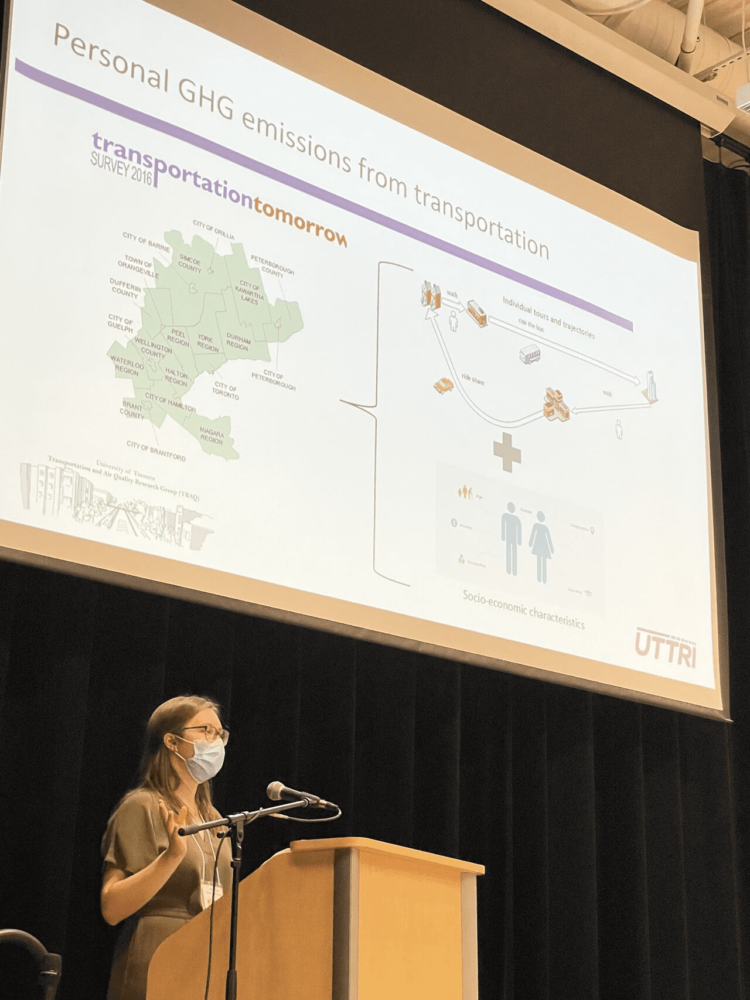 ly Farrar opened the youth climate action conference Generation Green on April 25, 2022 with a keynote presentation breaking down the intersection of climate change mitigation, the transport sector, and what we can do to build better cities in the future (as shown in the left figure).
ly Farrar opened the youth climate action conference Generation Green on April 25, 2022 with a keynote presentation breaking down the intersection of climate change mitigation, the transport sector, and what we can do to build better cities in the future (as shown in the left figure).
She shared her knowledge of the personal carbon footprint from transportation and how personal transportation choices and household circumstances affect GHG emissions with the audience of high school students.
Emily is a PhD student in the Department of Civil & Mineral Engineering supervised by Professor Marianne Hatzopoulou, and a member of the new Positive Zero Transport Futures team.
Generation Green is a youth-led initiative with the goals of engaging Halton students in climate action leadership, and supporting them in their commitment to greenhouse gas emission reductions in order to drive change and action in their communities. The Generation Green 2021-2022 event was presented by the Halton Climate Collective with sponsorship from the Halton Environmental Network, Halton District School Board, Halton Catholic District School Board, Town of Oakville, City of Burlington, Halton Region and the Halton Learning Foundation. Read more about Generation Green’s 2021-2022 event.
Participants Needed! Help Us Understand Air Quality in the Yonge and Eglinton Neighbourhood
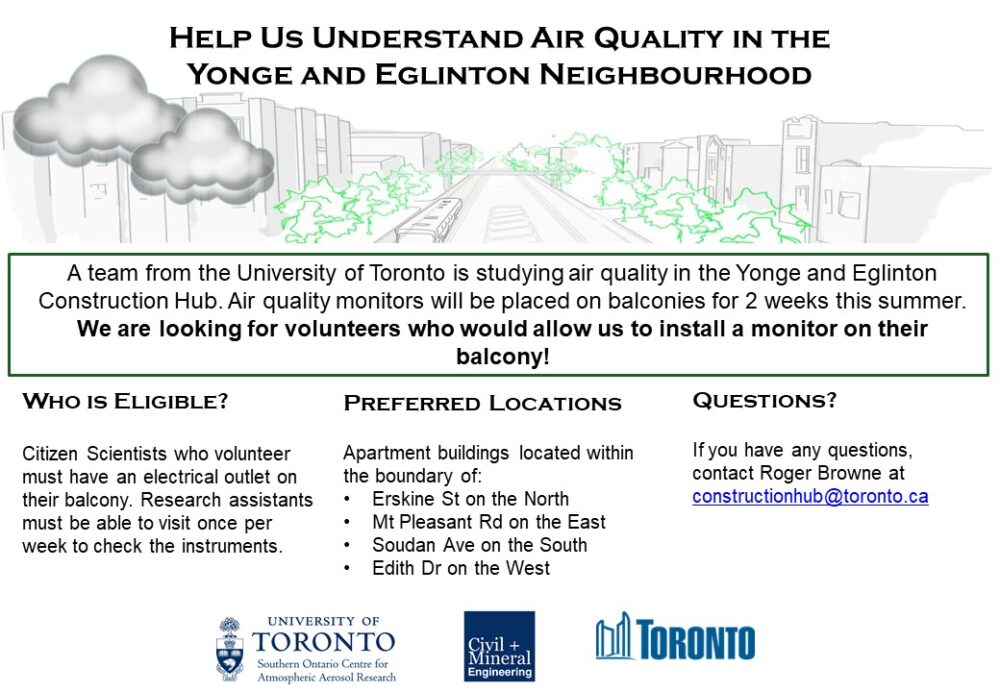 A team from the University of Toronto is studying air quality in the Yonge and Eglinton Construction Hub. Air quality monitors will be placed on balconies for 2 weeks this summer. We are looking for volunteers who would allow us to install a monitor on their balcony. Please sign up to participate here!
A team from the University of Toronto is studying air quality in the Yonge and Eglinton Construction Hub. Air quality monitors will be placed on balconies for 2 weeks this summer. We are looking for volunteers who would allow us to install a monitor on their balcony. Please sign up to participate here!
TEDxUofT: Healthier Cities – One Neighbourhood at a Time | Jeffrey Brook
Jeff Brook is the Scientific Director of the Canadian Urban Environmental Health Research Consortium (CANUE.CA) and Principal Investigator of HealthyDesign.City, which develops open science tools for Canadian assessments of health-relevant urban environmental conditions. Jeff has studied air pollution and its effects across Canada and globally for over 30 years. This was first as a senior scientist for Environment and Climate Change Canada and since 2018 as an assistant professor at the Dalla Lana School of Public Health and Department of Chemical Engineering and Applied Chemistry at the University of Toronto. This talk was given at a TEDx event using the TED conference format but independently organized by a local community. Read more…
 A new research collaboration supported by U of T Engineering’s Dean Strategic Fund aims to accelerate the decarbonization of transportation. For Professor Marianne Hatzopoulou (CivMin), who co-leads the new initiative, this means going well beyond clean technologies. “Decarbonization is not just about technology,” she says. “Promoting electric vehicles won’t help communities that are already mobility poor. What we…Read more
A new research collaboration supported by U of T Engineering’s Dean Strategic Fund aims to accelerate the decarbonization of transportation. For Professor Marianne Hatzopoulou (CivMin), who co-leads the new initiative, this means going well beyond clean technologies. “Decarbonization is not just about technology,” she says. “Promoting electric vehicles won’t help communities that are already mobility poor. What we…Read more
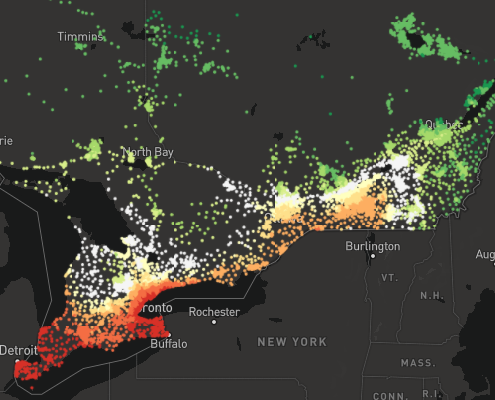
According to Prof. Jeff Brook at CANUE – the Canadian Urban Environmental Health Research Consortium – around 86 per cent of Canadians live in areas where airborne fine particulate matter levels exceed the WHO guidelines that were issued in last September (the left figure presents a map showing areas that exceed WHO guidelines on fine particulate matter)…Read more
People in the Greater Toronto Hamilton and Area (GTHA) use vehicles every day to travel to work, go to school, move goods, and do many other tasks. This vehicle travel emits air pollution that contributes to illness and premature deaths, and greenhouse gas emissions that are responsible for climate change. We’ve modelled five scenarios (plus a base case of current conditions) to compare the health benefits of reducing traffic pollution from cars and SUVs, trucks, and buses. Each scenario explores what the GTHA can look like with a specific mix of cleaner vehicles, and how this shift impacts air pollution, improves health, and reduces greenhouse gas emissions in the region.…Read more
With thousands of wells and counting, the Northeast region of British Columbia is one of Canada’s most important hubs of hydraulic fracturing, or fracking — the process of blasting pressurized liquid at rock formations to fracture them and release the natural gas trapped inside. Part of the region sits atop the Montney Formation, a massive,…Read more
 What rolls around the city getting a lot of admiring looks for its flashy chromed finishes and high tech roof protrusions? It’s not the latest tech from a popular web search engine company; it’s something entirely different. Meet UrbanScanner, a mobile testing laboratory on wheels, in the form of an automobile, researchers are driving around (the figure below demonstrates the mobile measurement platform – Urban Scanner ),…Read more
What rolls around the city getting a lot of admiring looks for its flashy chromed finishes and high tech roof protrusions? It’s not the latest tech from a popular web search engine company; it’s something entirely different. Meet UrbanScanner, a mobile testing laboratory on wheels, in the form of an automobile, researchers are driving around (the figure below demonstrates the mobile measurement platform – Urban Scanner ),…Read more
In an interview with Global News, Prof. Greg Evans and Prof. Jeffrey Brook explain why gasoline-powered garden equipment can be hazardous to the environment and our health, polluting the air we breathe,…Read more
Electric vehicles are often touted as a means of mitigating climate change, but a new modelling study suggests that their public health benefits may be just as significant. “Local air pollution within urban environments is highly detrimental to human health,” says Professor Marianne Hatzopoulou (CivMin), who led the research. “When you have an electric vehicle with no tailpipe emissions,…Read more
 Air quality on Toronto subway platforms improved substantially with the rollout of new cars on Line 1, according to a new study by the University of Toronto’s Faculty of Applied Science & Engineering and Health Canada (the right figure shows a Toronto subway station platform)…Read more
Air quality on Toronto subway platforms improved substantially with the rollout of new cars on Line 1, according to a new study by the University of Toronto’s Faculty of Applied Science & Engineering and Health Canada (the right figure shows a Toronto subway station platform)…Read more
SOCAAR is pleased to announce that we have recently secured a project “AirSENCE-FIM Sensor Networks for Reliable and Affordable Fence-line and Community Air Quality Monitoring” under NSERC Alliance – OCE VIP program for academic and industry collaboration. This project aims to address global air quality challenges, specifically, surrounding industrial manufacturing sites for the monitoring of pollutants such as volatile organic compounds and dihydrogen sulphide,…Read more
There were virtually no cars, no trucks and few buses as the country went into lockdown mode. Shops and buildings were closed. Most people stopped commuting. And it was the same across most of the world. While millions of lives have been lost due to COVID-19, and people have suffered economic consequences, these short-term global shutdowns have had a marked effect on the environment,… Read more
 Researchers at the University of Toronto are developing an app that allows users to learn about air quality, greenery, walkability and other factors contributing to the environmental health of their neighbourhoods.,…economic consequences, these short-term global shutdowns have had a marked effect on the (photo by Sminonkr/Getty images),… Read more
Researchers at the University of Toronto are developing an app that allows users to learn about air quality, greenery, walkability and other factors contributing to the environmental health of their neighbourhoods.,…economic consequences, these short-term global shutdowns have had a marked effect on the (photo by Sminonkr/Getty images),… Read more

Air pollution is a major killer, even in places we think of as ‘safe,’ so scientists are using new technology to measure it and study its effects on our bodies (the above figure shows a heavily polluted area),… Read more
SOCAAR’s Prof. Marianne Hatzopoulou (CivE) and Keith Van Ryswyk (PhD student) collaborated with researchers across Canada and found that a one-year increase in pollution exposure of 10,000 nanoparticles per cubic centimetre – the approximate difference between quiet and busy city streets – increased the risk of brain cancer by more than 10%,… Read more
Next-generation sensing technology and high-powered data crunching systems were on display at the third annual Air & Odour Management Conference and Technology Showcase held at Hart House at the University of Toronto. The conference is co-chaired by Prof. Marianne Hatzopoulou,… Read more
 If you’re in Southern Ontario, you might see a white truck emblazoned with the word “Maple” traveling the streets. No, it’s not a Canadian-themed food truck. Instead, it is filled with sensitive equipment that can measure the composition and size of particulate matter in the air (the left photo shows a mobile measurement platform – Maple),… Read more
If you’re in Southern Ontario, you might see a white truck emblazoned with the word “Maple” traveling the streets. No, it’s not a Canadian-themed food truck. Instead, it is filled with sensitive equipment that can measure the composition and size of particulate matter in the air (the left photo shows a mobile measurement platform – Maple),… Read more
 The Southern Ontario Centre for Atmospheric Aerosol Research (SOCAAR) is teaming up with the City of Oshawa to launch a one-year TeachingCity research study that will monitor air quality and traffic movements in Oshawa’s downtown core. A.U.G. Signals Ltd., and North Line Canada are also part of the project team (A photo showing the installation process of air quality sensors),… Read more
The Southern Ontario Centre for Atmospheric Aerosol Research (SOCAAR) is teaming up with the City of Oshawa to launch a one-year TeachingCity research study that will monitor air quality and traffic movements in Oshawa’s downtown core. A.U.G. Signals Ltd., and North Line Canada are also part of the project team (A photo showing the installation process of air quality sensors),… Read more